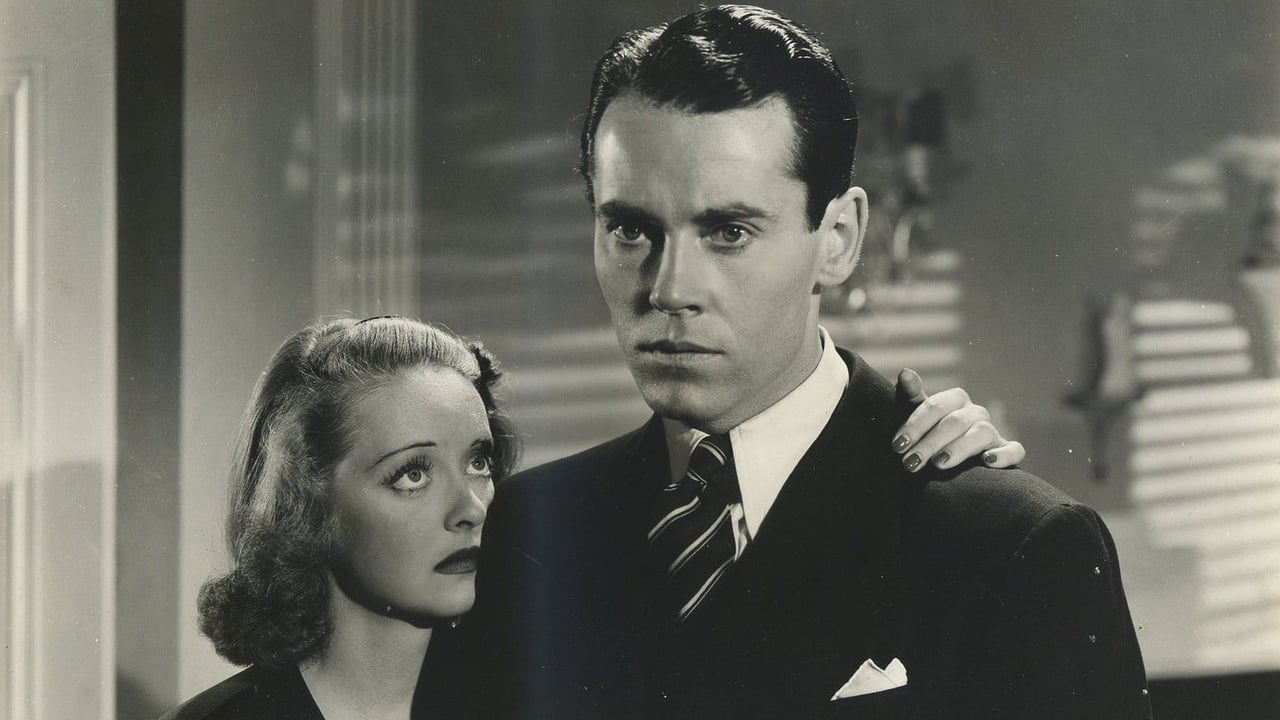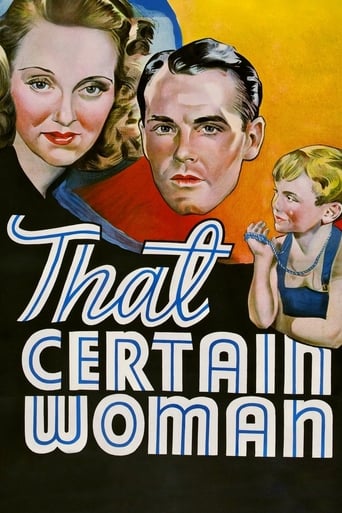

Director: EDMUND GOULDING. Screenplay: Edmund Goulding. Suggested by the 1914 stage play Outcast by Hubert Henry Davies. Photography: Ernest Haller. Film editor: Jack Killifer. Music: Max Steiner. Art director: Max Parker. Costumes designed by Orry-Kelly. Wardrobe master: Elmer Ellsworth. Wardrobe mistress: Mary Dery. Hair styles: Mary Donovan. Stills: Bert Six. Music director: Leo F. Forbstein. Grip: Stanley Young. Gaffer: Claude Hutchinson. Continuity girl: Alma Dwight. Property master: William L. Kuehl. Assistant director: Chuck Hansen. Unit manager: Robert Fellows. Sound recording: Dolph Thomas. Associate producer: Robert Lord.Copyright 26 July 1937 by Warner Brothers Pictures, Inc. New York opening at the Strand: 15 September 1937. U.S. release: 18 September 1937. 93 minutes. SYNOPSIS: Although loved by her employer, a successful lawyer, a gangster's widow marries the weakling son of a powerful tycoon who soon has her marriage annulled. COMMENT: A partial remake of "The Girl from 10th Avenue" (1935) with Ian Hunter virtually repeating his role from that film. Davis, however, is no longer the girl, but the woman. And a very glamorous woman at that, though still, of course, supremely self-sacrificing. In fact, it seems to have been Goulding's intention to load his screenplay with every cliché known to women's magazine fiction (including Madame Butterfly). Character, continuity, credibility - all simply go by the board. Not that Bette minds in the least. As long as Haller's camera stays firmly focuses upon her (which it does) and she's indulged in the full "star treatment", she's happy. Ian Hunter presumably didn't mind either. He could now play the part standing on his head. But Henry Fonda was heard to object that his role was a thankless one that would hardly induce picture-goers to cheer in the aisles. His objections were brushed aside. It's Davis's movie. Flatteringly costumed and photographed (often in radiant close-up), Bette has a field day.It's amazing how you can recognize Goulding's style (even if you come late and miss his name on the credits). Not only are close-ups liberally used to hold up the action throughout (always meticulously composed and beautifully lit), but the characters themselves are imbued with a larger-than-life quality (which I must admit some movie fans find attractive), which is further emphasized by somewhat stilted dialogue delivery and slow, mannered movements. Not only does Davis benefit from this style of actor-coddling direction, but also Ian Hunter, Donald Crisp and Dwayne Day. Fonda is obviously putting up a fight. In his earlier scenes, he has reams of dialogue which he reels off at a commendably breakneck pace which must have had Goulding in a fury. No doubt he was pacified by Miss Davis, for the quicker Fonda's scenes were over and done with, the more the camera could linger on her brave fortitude and inward tears. Yes, this is firmly Bette's movie. Aside from an occasional emphasis on the Ian Hunter character, and a bit of boring business with young Dwayne Day, plus a nod or two in the directions of Hugh O'Connell and Donald Crisp, the other players have little to do.Anita Louise's role is ridiculously small. And as for the big line- up of character players, aside from Mary Phillips and Frank Darien, if you blink you'll miss them!
... View MoreHere, Davis plays a secretary, Mary Donnell, with a past: she was once married to a mobster when she was very young. He is now dead but the press will not let her forget her past and move forward. Jack Merrick , Jr. (Henry Fonda) is in love with Mary. He marries her—promising to stand on his own feet rather than living off of his wealthy father, (Donald Crisp). But Jack's father first forbids the marriage then, after they get married, he has it annulled, and sweeps Jack off to Europe.However, Mary has Jack's baby and names him Jackie. She is emotionally supported by her maid, Amy (Mary Philips)-who here plays a role something like Thelma Ritter would play in later movies. Mary is also supported by her understanding boss, Lloyd Rogers (Ian Hunter), who has an unhappy marriage and is not-so-secretly in love with Mary. But, his love is unrequited.As the years pass and little Jackie grows, Mary remains in love with Jack: she can't get him out of her mind. Jack marries in Europe and he and his wife, 'Flip' (Anita Louise), are in a bad car accident that leaves her in a wheelchair for life. When Jack and Amy return to America, they both re-enter Mary's life: Jack is introduced to, and falls in love with, his 4-year-old son. 'Flip' makes a point of visiting Mary to ask her to marry Jack so that he can have a 'full life' with Mary and little Jackie.This is one of those Bette Davis melodramas in which she is asked to make personal sacrifice(s), but the movie has too MANY of these moments. In fact until the end, we are left wondering who she will have to sacrifice: Jack?—Jackie?—both?-neither? The only 'villains' of this movie are Jack's father, who continually foils the love between Mary and Jack, and the tabloid newspaper reporters who won't leave Mary alone.Surprisingly, the other women, of the movie (Mrs. Rogers, Flip, and even Amy)--who should resent Mary--are always way TOO understanding towards her. Not only does the movie suffer from an excess of these moments but the ending is WAY contrived too.It's too bad, because the movie seemed to show some promise at the beginning. All this aside, Bette Davis' acting is still the great stuff that we have learned to expect from her.
... View More"Mary" was the widow of one of the gangsters killed in the infamous St. Valentine's Day Massacre in Chicago in 1929. Married at the age of 15 1/2, she had no regrets about his passing, but was constantly hounded by sensation seeking reporters for pictures and a story. At film's beginning she was working as the valued secretary to a wealthy lawyer, who was married, but half in love with his lovely and hard-working "administrative assistant". At the same time, "Mary" was being aggressively wooed by a weakling scion of a wealthy and over-protective father, who despised "Mary" for her past association with a gangster. She marries the weakling anyway, has a son with him, but the father manages to annul the marriage. Neither son nor father knows about the baby at this time. The weakling, of course, runs off to Paris (where else?), marries another girl known as "Flip", and promptly crashes them both in a drunken motor accident. The weakling survives relatively unscathed but "Flip" ends up in a wheel chair for life. Four years later, upon learning that he has a grandson, the domineering father institutes proceedings to wrest guardianship of the little boy from "Mary". How does it all turn out? Why, by one of the more ridiculous deus ex machina endings of which Hollywood was fond. I'll let you find it out for yourself, even though I did check the spoilers box. Oh, yes. I forgot to mention that the lawyer for whom "Mary" worked took suddenly ill and died, so that she came into a legacy of $500,000! How's that for bad luck?! Poor Henry Fonda! He's the weak-kneed son. I despised this character from his first appearance in the film. He's very aggressive when coming on to women, a veritable John Wayne, but an arrant coward when face-to-face with his father. That's not he worst of this crazy, mixed up movie. The editing is worse than poor, it is haphazard. Take the opening scenes which show "Mary" along with companion "Amy" on the way to the cemetery to deliver flowers to the grave of the gangster former husband. Why? "Mary" didn't like him, she said. They are accompanied by a mysterious "Fred", who looks to be a sort of guardian angel to "Mary", but who the heck is he? We never find out, and never see him again. Probably the explanation wound up on the cutting room floor. For that matter, who the heck is "Amy"? We do see her again, but we never find out if she is a relative, or what. Well, there are other mysteries never cleared up, but these will suffice as examples.There are some compensations for sitting through this mess. Bette, Ian Hunter (the lawyer), and Anita Louise, together make it worth a watch. The scene in which "Mary" and "Flip" meet is very good indeed. As for Henry Fonda, it is maybe not his finest hour, but not even a Barrymore could have made you empathise with this character. Perhaps it attests to his ability as an actor that we do detest his character so much, and the same can be said of Donald Crisp, who plays the mean-spirited father. You will have trouble resisting the impulse to hiss.
... View MoreAudiences will groan at the character of Mary Donnell. Bette Davis is normally looking out for number one--and she's definitely her good old self in the first half of the movie. The widow of a gangster, Donnell has become a super-competent legal secretary for a respected attorney in a big firm. She fends off unwanted press attention and generally handles herself quite well as a tough single girl in the big city.She becomes the mistress of her married boss at the law firm (although the Hays Office undoubtedly required the removal of any breath of sexual content here, it should be pretty obvious to all what is going on). In the second half of the movie, which focusses on Jack Merrick (Henry Fonda), whom Donnell has always loved, she achieves peaks of self-sacrifice that will send you staggering to the bathroom to throw up.This is the sort of film that gives soap opera a bad name.
... View More